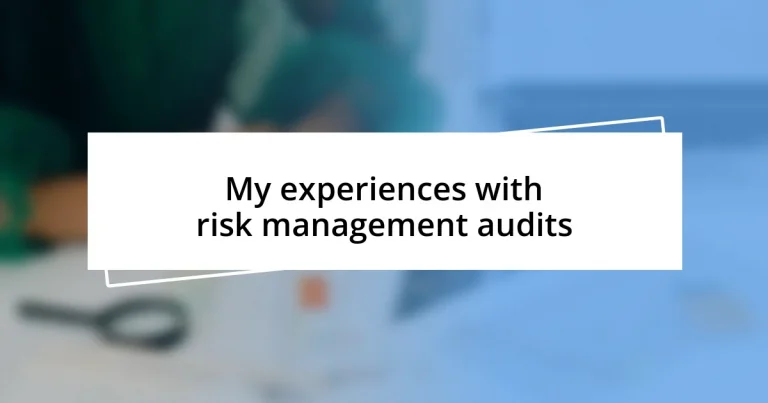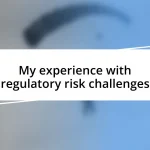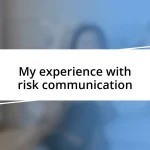Key takeaways:
- Risk management audits are crucial for early detection of issues and aligning risk strategies with business goals, preventing potential crises.
- Challenges such as resistance to change, complex data collection, and communication barriers highlight the need for collaboration and open dialogue during audits.
- Embracing technology, fostering a culture of communication, and conducting scenario planning are essential for enhancing future risk management practices.
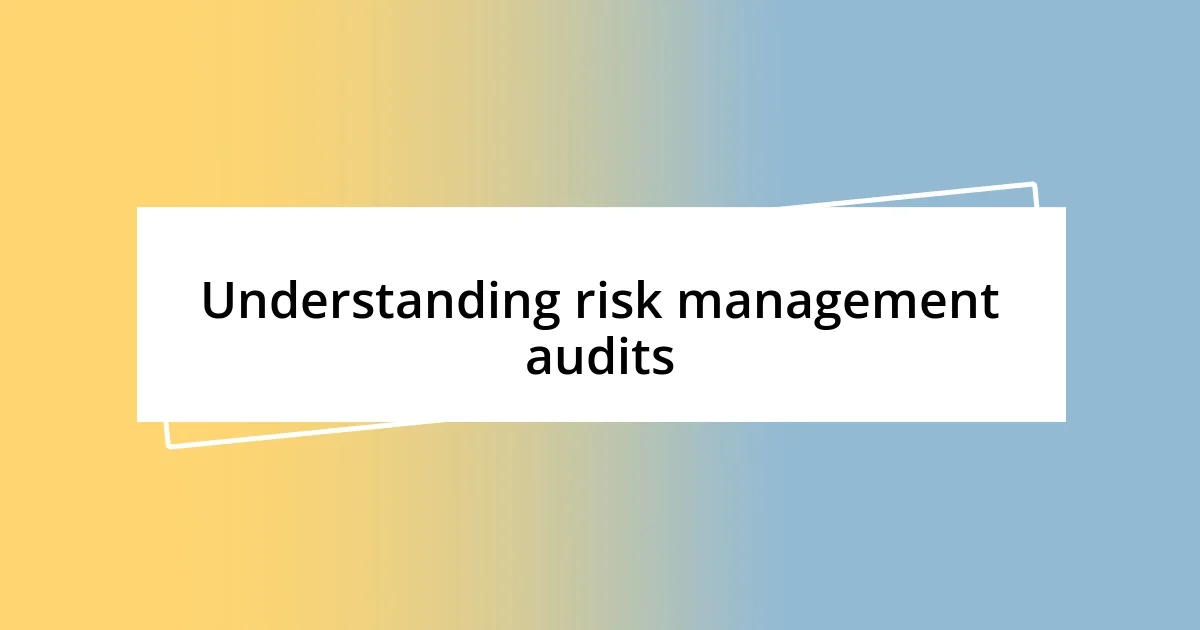
Understanding risk management audits
Understanding risk management audits can be a game-changer for organizations. I remember my first exposure to one—it felt overwhelming yet thrilling. The realization that systematic evaluations could uncover hidden vulnerabilities sparked a curiosity that has driven my career ever since.
At its core, a risk management audit is like taking a close look at your organization’s health. It’s not just about compliance; it’s about identifying potential pitfalls that could derail your success. Have you ever thought about how many risks go unnoticed until it’s too late? Reflecting on my own experiences, I’ve seen how timely audits can prevent disasters that seem to spring from nowhere.
The process involves assessing controls, evaluating risk appetite, and ensuring alignment with business objectives. I once witnessed an organization completely shift their strategy after an audit revealed critical blind spots. It was a powerful reminder of how these audits are more than just ticking boxes; they can lead to transformative change.
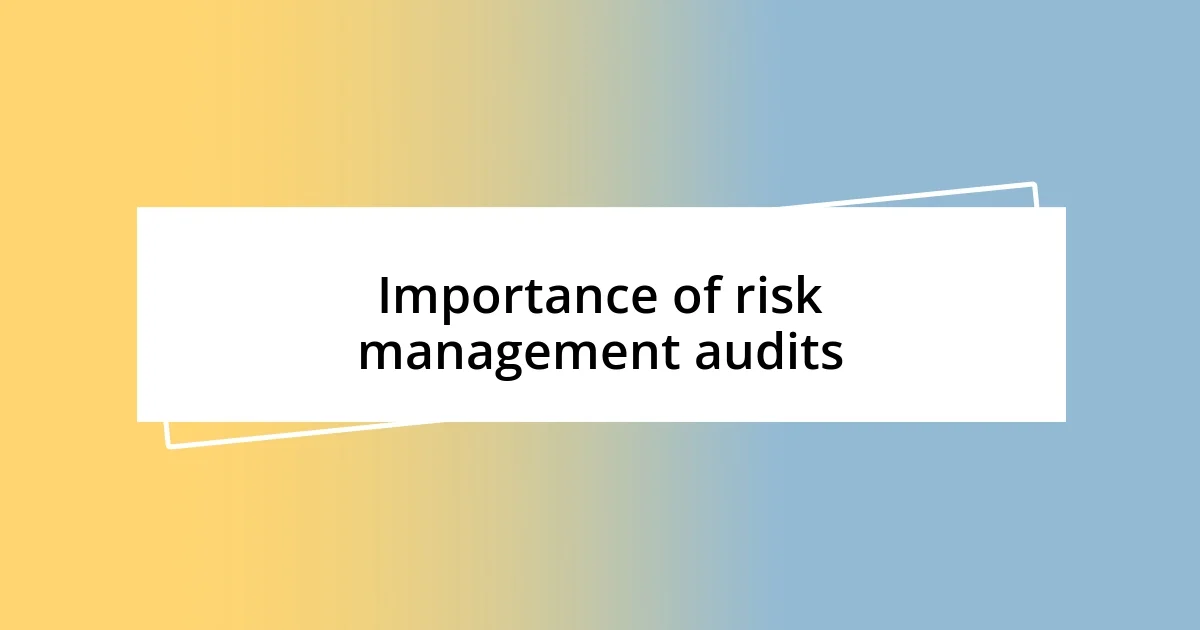
Importance of risk management audits
Risk management audits play a crucial role in sustaining and enhancing an organization’s stability and growth. I vividly recall a moment when a routine audit helped my team uncover a significant operational flaw. It was almost surreal to see how a seemingly insignificant oversight could have led to major financial losses if left unchecked. This experience highlighted the proactive nature of these audits, which allow organizations to identify vulnerabilities before they escalate into bigger issues.
Here are a few reasons why risk management audits are essential:
- Early Detection: They help in spotting issues before they become crises.
- Strategic Alignment: Audits ensure that risk management strategies are in line with business goals.
- Resource Optimization: They identify areas where resources can be utilized more effectively.
- Enhancing Trust: Conducting audits fosters transparency within the organization, building trust with stakeholders.
- Continuous Improvement: The insights gained lead to ongoing enhancement of policies and procedures.
Having been through this process multiple times, I can attest to its power. Each audit feels like a guided exploration into the heart of an organization’s operations, revealing insights that can steer future decisions.
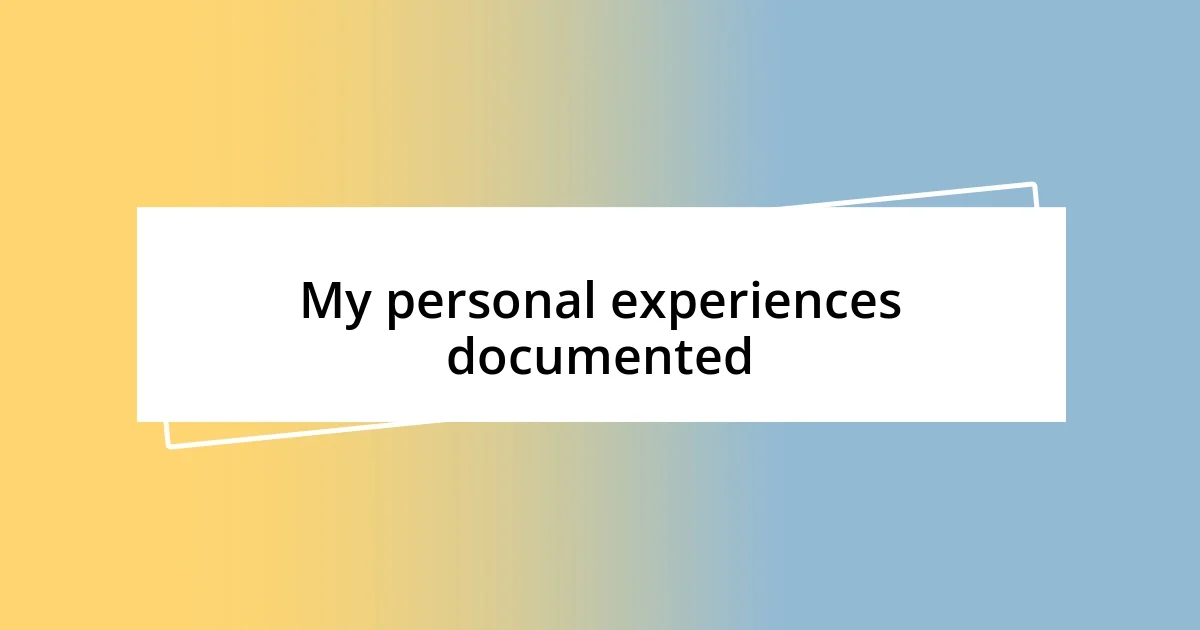
My personal experiences documented
I distinctly remember a particularly eye-opening audit during a time when our team felt invincible. We were winning projects left and right, and the last thing on anyone’s mind was risk. However, this audit forced us to confront some uncomfortable truths about our existing processes. I still recall the palpable tension in the room as the lead auditor presented their findings, revealing overlooked risks that threatened our very success. It was a stark reminder that complacency can be the enemy of progress.
On another occasion, I had the opportunity to conduct a follow-up audit after implementing recommendations from a previous assessment. I was genuinely excited to see how our changes had impacted operations. Looking back, that experience taught me just how important it is to measure success not only in profits but also in the strength of our risk management strategies. Watching the team come together to reinforce a culture of vigilance was incredibly rewarding; it felt like we were finally understanding the value of the audits in our daily operations.
It’s fascinating how personal experiences shape our understanding of risk management. Each audit I participated in left me with a clearer impression of the critical relationship between risk and opportunity. I often find myself reflecting on how these experiences have not only molded my professional approach but also fueled my passion for continuous improvement.
| Experience | Key Takeaway |
|---|---|
| Audit revealing overlooked risks in a winning team | Complacency can hide significant vulnerabilities. |
| Follow-up audit showing improvements post-recommendations | Measuring success includes strengthening risk management. |
| Personal evolution through audit experiences | Risk management shapes professional growth and opportunity. |
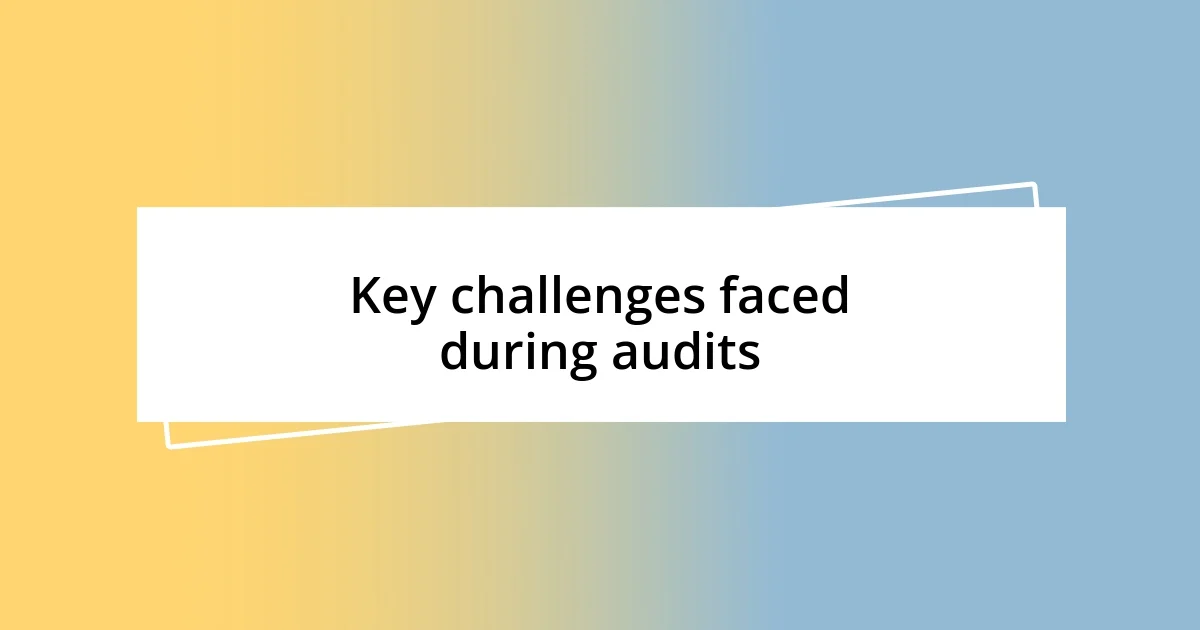
Key challenges faced during audits
Navigating the challenges of risk management audits can be quite a rollercoaster ride. One of the key hurdles I’ve encountered is resistance to change. I recall a vivid scenario where my team hesitated to embrace new risk mitigation strategies during an audit. It was disheartening to watch the fear of disruption overshadow the potential for improvement. I often wonder, why does it take a crisis for teams to open their eyes to the need for evolution?
Another significant challenge is the complexity of data collection. In one audit, I remember sifting through endless spreadsheets and reports, trying to piece together a coherent picture of risk exposure. It felt overwhelming at times, like finding a needle in a haystack. I sometimes question, how can we streamline this process to make it more efficient? I believe embracing technology can bridge that gap, turning tedious tasks into manageable ones.
Lastly, communication barriers often arise during audits. I vividly recall an instance where different departments struggled to understand each other’s risk landscapes. There was confusion over terminology, which made collaboration difficult. It made me think: how can we foster a culture that encourages open dialogue about risks? In my experience, creating a shared vocabulary and regular cross-departmental meetings can pave the way for clearer understanding and smoother audits.
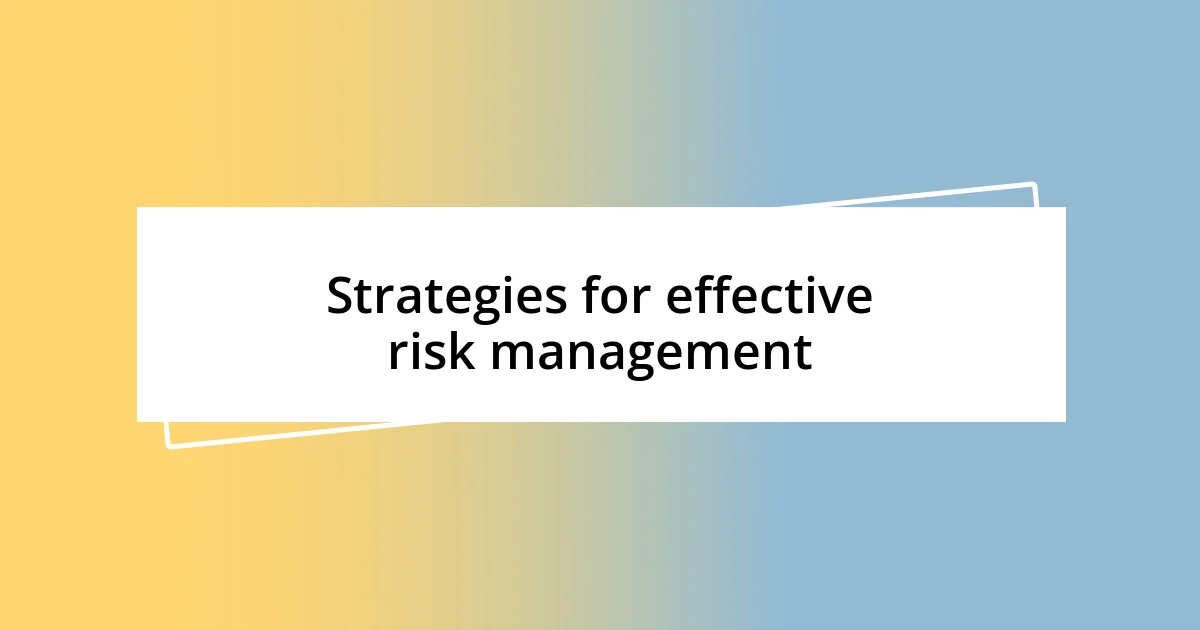
Strategies for effective risk management
When I think about effective risk management, one strategy that stands out is the importance of collaboration across all levels of the organization. I vividly recall a project where the project managers and the finance team came together for a brainstorming session. The energy in that room was contagious as we exchanged insights, and suddenly, new perspectives on potential risks emerged. It made me realize that breaking down silos can be incredibly empowering. Have you ever experienced a moment where a simple conversation shifted your understanding of a problem?
Another essential strategy I’ve found is the need for continuous education and training regarding risk awareness. I remember an enlightening workshop I attended that focused on real-life case studies. The discussions around failures and successes in risk management were invaluable. It not only fostered a sense of accountability but also encouraged everyone to view risk management as part of their everyday responsibilities rather than a dreaded audit. How often do we get caught up in routine, forgetting that learning should always be a priority?
Lastly, implementing a proactive approach rather than a reactive one has consistently proven beneficial. I had the opportunity to be part of a preemptive risk assessment before a major project launch. Instead of merely responding to issues as they occurred, we identified potential obstacles in advance and developed strategies to address them. The outcome was nothing short of impressive. It got me thinking, what would happen if more organizations adopted this mindset? Emphasizing proactive measures can shift the entire risk management culture to one that’s more resilient and forward-thinking.

Lessons learned from my audits
The audits taught me the vital lesson of embracing adaptability. I remember one audit when unexpected challenges forced my team to rethink our approach midway. It felt like we were riding a wave that kept changing, and at first, it was stressful. Yet, once we began to adjust our strategies on the fly, I discovered the power of flexibility. Isn’t it fascinating how discomfort can lead to such valuable growth?
Another critical takeaway was the significance of thorough documentation. I had an experience where inadequate records made it nearly impossible to track project progress during an audit. Frustration bubbled up as I realized that without clear documentation, we were almost flying blind. This drove home the point that well-maintained records are not just a formality—they’re the backbone of effective audits. How often do we overlook something so essential?
I’ve also learned that engaging stakeholders early in the audit process is crucial. There was a time when I decided to hold preliminary discussions with various department heads instead of waiting for the formal audit kickoff. The insights I gained were profound and filled with nuances I hadn’t considered. By fostering relationships and open dialogue from the start, I found that we could uncover potential risks earlier. Why wait for the audit to start the conversation when collaboration can lead us to better outcomes right away?
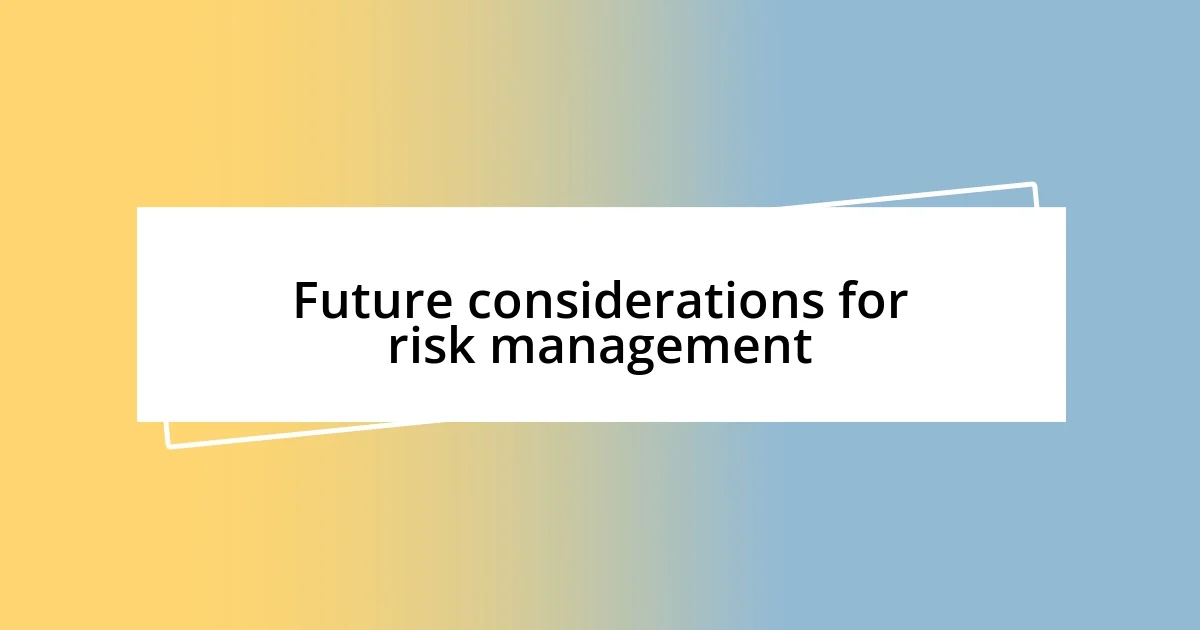
Future considerations for risk management
One major consideration for the future of risk management is the integration of technology. I remember attending a tech conference where several start-ups showcased AI-driven risk assessment tools. The excitement in the air was palpable as attendees discussed how these innovations could streamline processes. Have you ever thought about how automation might transform your approach to risk? I believe that embracing technology can lead to real-time data analysis, uncovering risks before they escalate.
Another important factor is the need for a culture that prioritizes open communication. In one of my projects, I noticed a significant improvement when team members felt encouraged to voice their concerns without fear of blame. It was a game-changer, fostering trust and collective problem-solving. What if we could build an environment where everyone feels empowered to speak up? By nurturing such an atmosphere, organizations can proactively identify risks and work collaboratively to address them.
Additionally, as I reflect on my experiences, the importance of scenario planning cannot be overstated. During a particularly intense project, we conducted “what-if” sessions that revealed potential pitfalls we hadn’t even considered. It was like turning on a light in a dark room, illuminating paths we could take to mitigate risks. Why not engage in these foresight exercises regularly? I believe that anticipatory thinking will shape more robust risk management strategies in the years ahead.












